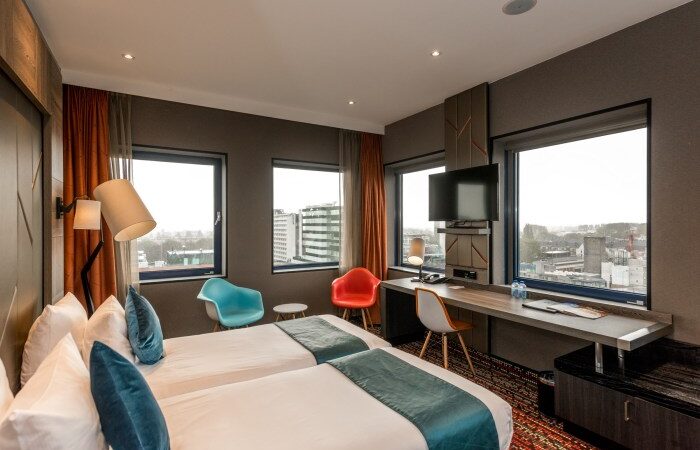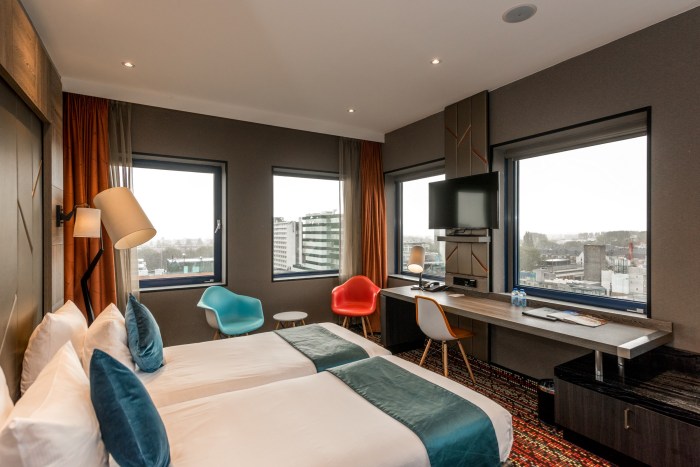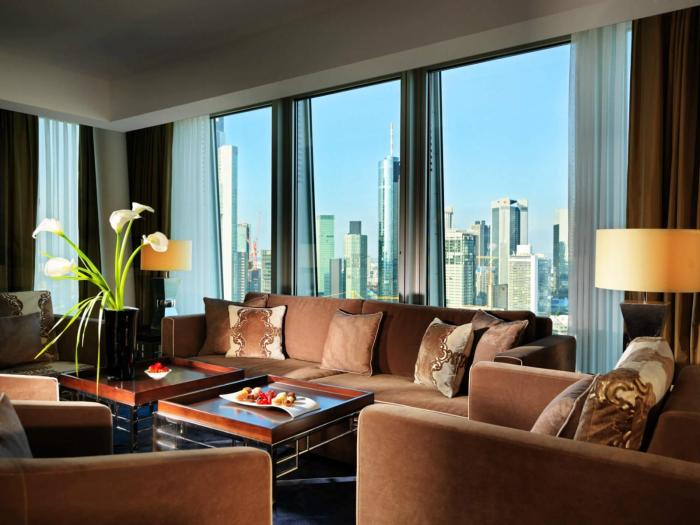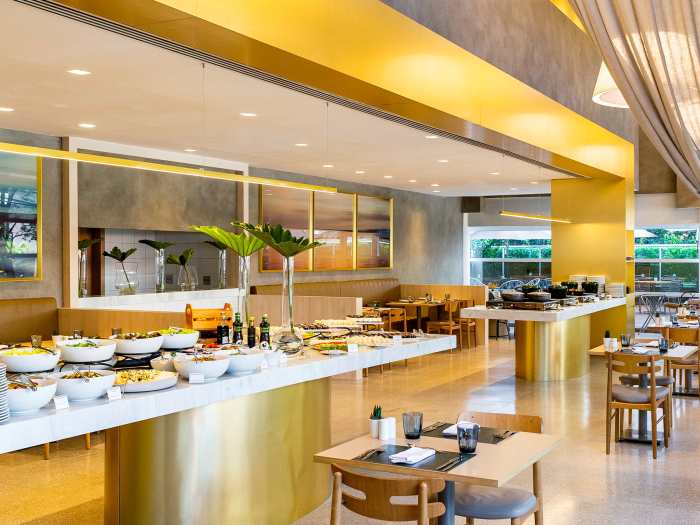Best Hotels for Business Travel Finding the Perfect Stay

Best hotels for business travel aren’t just about a comfy bed; they’re about maximizing productivity and minimizing stress. This guide dives into what truly makes a hotel ideal for the business traveler, covering everything from location and amenities to pricing and reviews. We’ll help you find the perfect spot, whether you’re a solo entrepreneur or leading a large team.
Choosing the right hotel can significantly impact your business trip’s success. We’ll explore the key factors business travelers prioritize – from convenient locations near airports and business districts to essential amenities like high-speed internet and ergonomic workspaces. We’ll also look at how to navigate pricing strategies, read reviews effectively, and ultimately find the best value for your money, ensuring a smooth and productive trip.
Defining “Best” for Business Travelers
Choosing the “best” hotel for business travel isn’t simply about luxury; it’s about efficiency and productivity. The ideal hotel caters to the specific needs of the traveler, maximizing their time and minimizing distractions. This means different things to different travelers, and understanding these nuances is key to finding the perfect accommodation.
Top Three Priorities for Business Travelers
The three factors most consistently prioritized by business travelers are location, reliable Wi-Fi, and comfortable workspace. Location minimizes commute time to meetings and events, saving valuable hours. Reliable Wi-Fi is crucial for maintaining communication and completing urgent tasks. A comfortable workspace, whether a dedicated desk or a well-designed seating area, allows for efficient work outside of the office. These factors are paramount for both individual travelers and those traveling in teams.
Differences in Priorities Between Solo and Team Travelers
Solo business travelers often prioritize hotels with convenient amenities like a well-equipped gym or a quiet workspace for uninterrupted focus. They may be more willing to compromise on shared spaces in exchange for a more private and efficient experience. Team travelers, conversely, tend to value hotels with ample meeting rooms, readily available group dining options, and sufficient space for collaborative work. The presence of readily available group dining options minimizes the logistical challenges of feeding a team and allows for informal networking opportunities. The availability of multiple rooms connected by an internal passage is also a significant factor for team travel.
Location versus Amenities: A Balancing Act
While a prime location is undeniably important, its value is often weighed against the quality of amenities offered. A hotel in a less central location might offer better value for money, larger rooms, or more extensive facilities such as a business center with printing services, which are important to business travelers. Conversely, a hotel in a prime location might lack some of these amenities, but its proximity to key business areas significantly reduces travel time and stress. The optimal balance depends on the individual trip and the traveler’s priorities.
A Rating System for Business Hotels
A comprehensive rating system for business hotels should incorporate a weighted scoring system. We suggest a system where location, Wi-Fi reliability, and workspace comfort each account for 30% of the overall score, with the remaining 10% allocated to additional factors such as cleanliness, customer service, and overall value. This allows for a more nuanced assessment of a hotel’s suitability for business travel. For example:
| Factor | Weighting | Scoring (1-5, 5 being best) |
|---|---|---|
| Location | 30% | 4 |
| Wi-Fi Reliability | 30% | 5 |
| Workspace Comfort | 30% | 4 |
| Cleanliness | 5% | 5 |
| Customer Service | 5% | 4 |
This example hotel would receive an overall score of 4.45 (calculated as (4*0.3) + (5*0.3) + (4*0.3) + (5*0.05) + (4*0.05)).
Location and Accessibility

Source: rydoo.com
Choosing a hotel with a convenient location is crucial for efficient business travel. The ideal location depends heavily on the purpose and duration of your trip, balancing proximity to your work locations with ease of access to transportation hubs. A poorly chosen location can lead to wasted time and increased stress, negatively impacting productivity.
Proximity to business districts, airports, and public transportation are key factors. For short-term projects focused on a specific client or office, a hotel within walking distance or a short taxi ride from your destination is best. Longer trips or those involving multiple meetings across a city might benefit from a location near a major transportation hub, enabling easy access to various parts of the city. Conference attendees might prioritize hotels near the conference venue itself, or at least with convenient access to shuttles.
Ideal Hotel Locations for Different Business Trip Types
Hotels catering to various business needs often cluster in specific areas. For example, hotels near major airports often offer convenient shuttle services and cater to travelers with early flights or late arrivals. Hotels in central business districts typically offer easy access to corporate offices and business meeting venues. Hotels near convention centers are a popular choice for those attending conferences or trade shows. For instance, hotels near the Jacob K. Javits Convention Center in New York City are highly sought after during large industry events. In contrast, hotels situated near specific technological hubs, such as Silicon Valley in California, may attract tech professionals to attend meetings or conferences in the area. These hotels often feature amenities geared towards this clientele.
Evaluating Hotel Accessibility for Travelers with Disabilities
Accessibility is a critical factor to consider when selecting a business hotel. Look beyond basic wheelchair access and consider features such as accessible restrooms with grab bars and ample space, elevators with audible signals, and visual alerts for fire alarms. Websites often provide detailed accessibility information, including room dimensions and descriptions of accessible features. When booking, it’s always best to contact the hotel directly to confirm accessibility features and request specific accommodations. Organizations like the Americans with Disabilities Act (ADA) offer resources and guidelines for accessible travel. Reviewing online reviews from travelers with disabilities can also provide valuable insights into the hotel’s accessibility features and services.
Transportation Options and Costs in Major Business Hubs
The cost and convenience of transportation options vary significantly depending on the city and the hotel’s location. Below is a comparison of transportation options near hotels in three major business hubs: New York City, London, and Tokyo. Note that prices are estimates and can fluctuate based on time of day and demand.
| City | Public Transit | Taxi | Ride-Sharing |
|---|---|---|---|
| New York City | Subway ($2.75 per ride), Buses (variable fare) – extensive network, often quickest option. | Expensive, highly variable based on distance and traffic ($30-100+). | Moderately priced, subject to surge pricing ($20-60+). |
| London | Tube (variable fare), Buses (variable fare) – extensive network, efficient but can be crowded during peak hours. | Expensive, metered fare ($30-80+). | Moderately priced, similar to NYC in terms of surge pricing ($25-70+). |
| Tokyo | Extensive and efficient subway and train network (variable fare, often cheaper than taxis). | Expensive, metered fare ($40-100+). | Moderately priced, less prevalent than taxis or public transport ($30-80+). |
Hotel Amenities for Business Travelers
Choosing the right hotel for business travel often hinges on more than just location. The amenities offered significantly impact a business traveler’s productivity, comfort, and overall experience. Let’s delve into the specifics of what makes a hotel truly business-friendly.
Essential Amenities Enhancing Productivity
High-speed, reliable internet is paramount. Business travelers rely on seamless connectivity for video conferencing, email, and accessing crucial data. A well-equipped business center, offering printing, scanning, and fax services, is also crucial. Ergonomic workspaces, including comfortable chairs and well-lit desks, are essential for maintaining productivity and preventing discomfort during long work sessions. Many hotels now offer dedicated work areas outside of guest rooms, providing a change of scenery and promoting focus.
Comparison of Business-Centric Amenities Across Brands
Different hotel brands cater to business travelers with varying levels of sophistication. Luxury chains often provide dedicated concierge services for business needs, arranging meetings, transportation, and even securing last-minute appointments. Mid-range hotels typically offer functional business centers and reliable Wi-Fi, while budget-friendly options may focus on providing basic internet access and potentially a small work desk in the room. Marriott, for example, frequently boasts robust business centers and high-speed internet packages, while Hilton often emphasizes its loyalty program benefits for frequent business travelers, including upgrades and access to executive lounges. Boutique hotels might offer unique amenities, such as personalized workspace setups or curated coffee selections, to attract the business traveler.
Impact of In-Room Amenities on Business Traveler Satisfaction
In-room amenities play a surprisingly significant role in overall satisfaction. A mini-refrigerator allows for storing medication, healthy snacks, or drinks, promoting well-being and preventing disruptions to the workday. A coffee maker provides a quick caffeine fix, eliminating the need to leave the room early in the morning or search for a nearby café. These seemingly small conveniences contribute to a more comfortable and productive stay, reducing stress and maximizing efficiency.
Unexpected Amenities Enhancing the Business Travel Experience
Beyond the standard offerings, some hotels provide unexpected amenities that significantly elevate the business travel experience. These might include:
- A fitness center with on-demand fitness classes, catering to busy schedules.
- Dry cleaning or laundry services with rapid turnaround times.
- Late check-out options for flexibility.
- Access to healthy food options, such as fresh fruit and yogurt in the breakfast buffet.
- Noise-canceling headphones for uninterrupted work in the room or during travel.
These thoughtful additions demonstrate a commitment to the business traveler’s needs and contribute to a more positive and productive trip.
Pricing and Value for Business Travelers

Source: trivago.com
Finding the right hotel for business travel often involves balancing costs with the services and amenities that enhance productivity and comfort. Understanding pricing structures and how hotels demonstrate value is crucial for maximizing your travel budget.
Corporate rates and loyalty programs significantly impact the overall cost of business trips. Negotiated corporate rates with hotels often provide substantial discounts compared to publicly advertised prices. These rates are typically secured through contracts between companies and hotel chains, offering consistent savings for frequent business travelers. Loyalty programs, such as Marriott Bonvoy or Hilton Honors, offer points or status benefits that can translate to free nights, upgrades, and other perks, further reducing the cost of accommodation over time. For example, a company with a contract might receive a 20% discount on standard rates, while accumulating points in a loyalty program could lead to a free stay after several trips.
Corporate Rates and Loyalty Program Impact
Corporate rates are pre-negotiated discounts offered to businesses that book rooms in bulk or have established a long-term relationship with a hotel. These rates are often significantly lower than the standard public rate and can be a substantial cost-saving measure for companies. Loyalty programs, on the other hand, reward individual travelers for their repeated business with a specific hotel chain. Points earned can be redeemed for free nights, room upgrades, late check-out, and other benefits. Combining corporate rates with loyalty program participation maximizes savings and enhances the overall travel experience. The value proposition here is two-fold: immediate cost reduction via corporate rates and long-term benefits through loyalty program accumulation.
Demonstrating Value Beyond Price
Hotels demonstrate value beyond price through various means. High-speed, reliable internet access is essential for business travelers, and hotels that offer this as a complimentary or reliably high-quality service add value. Well-equipped business centers with printing, copying, and scanning facilities are also important. Comfortable workspaces within the room, such as a large desk and ergonomic chair, enhance productivity. Access to meeting rooms or event spaces can be crucial for business negotiations or small conferences. Concierge services, airport transfers, and on-site restaurants providing convenient and healthy meal options are all examples of value-added services. A hotel with excellent customer service, ensuring quick issue resolution and personalized attention, also contributes to the overall value proposition.
Strategies for Finding Best Value Hotels
Finding the best value hotel depends on budget and priorities. For budget-conscious travelers, exploring hotels slightly outside the city center can often yield significant savings without sacrificing accessibility. Utilizing online travel agencies (OTAs) and comparing prices across multiple platforms is essential. Looking for hotels offering package deals that include breakfast or other amenities can enhance value. For travelers with higher budgets, focusing on hotels with premium amenities like spas, fitness centers, and personalized concierge services can justify the higher price point. Reading reviews and checking ratings on sites like TripAdvisor can provide insights into the overall experience and value offered by different hotels.
Comparison of Pricing Models
Different hotels offer various pricing models to cater to different needs. Understanding these models helps in selecting the most cost-effective option.
| Pricing Model | Description | Best for | Potential Drawbacks |
|---|---|---|---|
| Per Night | Standard pricing is based on a single night’s stay. | Short business trips. | Can be more expensive for longer stays. |
| Per Week | Discounted rate for a week-long stay. | Longer business trips, and projects. | May not be suitable for shorter stays. |
| Package Deals | Bundled services, such as accommodation, breakfast, and airport transfers. | Travelers seeking convenience and value. | May include unnecessary services. |
| Corporate Rates | Negotiated discounts for businesses. | Companies with frequent business travel. | Requires pre-arrangement with the hotel. |
Hotel Reviews and Reputation: Best Hotels For Business Travel
Choosing the right hotel for business travel often hinges on more than just location and amenities; it’s about understanding the real-world experience of other travelers. Hotel reviews offer invaluable insight into the day-to-day realities of a hotel, allowing you to make an informed decision that aligns with your needs and expectations. A thorough review of guest feedback can prevent unexpected issues and ensure a productive and comfortable trip.
Reliable Sources for Unbiased Hotel Reviews
Finding truly unbiased reviews can be tricky, but several platforms offer a good starting point. Websites like TripAdvisor, Booking.com, and Google Hotels aggregate reviews from a large number of travelers. While no system is entirely immune to fake reviews, these platforms generally employ systems to detect and remove them. Reading reviews across multiple platforms can help you get a more balanced perspective. Furthermore, focusing on reviews from verified guests, those who booked through the platform directly, helps filter out potentially less reliable feedback. Business-specific review sites, if available for your chosen hotel, offer another layer of relevant feedback.
The Importance of Considering Both Positive and Negative Reviews, Best hotels for business travel
Don’t just focus on the glowing five-star reviews. While positive feedback paints a picture of the hotel’s strengths, negative reviews often highlight potential problems. A consistent pattern of negative feedback about a specific issue—for example, slow Wi-Fi or noisy rooms—should raise a red flag, regardless of the overall star rating. Looking at both sides of the coin helps you build a realistic expectation of your stay. For example, while a hotel may boast luxurious rooms, consistently negative reviews regarding slow check-in processes could indicate potential time management issues during your business trip.
Types of Reviews Valuable for Business Travelers
Business travelers have specific needs, so certain aspects of a hotel are more crucial than others. Reviews mentioning reliable and high-speed Wi-Fi are paramount, as is feedback regarding the quietness of rooms and the availability of workspaces. Reviews that discuss the quality of the breakfast (especially if you need a quick and efficient morning meal) are also highly relevant. Look for details on the availability of business amenities like meeting rooms, printing services, and readily available outlets. Comments about the hotel’s proximity to transportation hubs and local businesses are also important. For instance, a review mentioning readily available and reliable taxi services or convenient public transportation access is more valuable than a general comment about the hotel’s location.
Interpreting Hotel Star Ratings and Ranking Systems
Star ratings and ranking systems offer a quick overview, but they shouldn’t be your sole guide. Remember that these systems are subjective and vary across platforms. A four-star hotel on one site might be equivalent to a three-star hotel on another. Instead of relying solely on star ratings, focus on the number and content of reviews. A hotel with a high average star rating but few reviews might be less reliable than a hotel with a slightly lower rating but hundreds of reviews providing detailed feedback. Always delve deeper into the individual reviews to gain a comprehensive understanding. For instance, a hotel with a 4.5-star rating based on 5 reviews is less reliable than a hotel with a 4-star rating based on 500 reviews, as the latter offers a larger sample size and a broader perspective.
Visual Representation of Ideal Business Hotels

Source: atyourbusiness.com
The visual appeal of a business hotel significantly impacts a traveler’s perception of its suitability and overall experience. A well-designed hotel communicates professionalism, comfort, and productivity, attracting a wider range of business clientele. The visual elements, from architecture to website design, play a crucial role in shaping the brand image and influencing booking decisions.
Successful business hotels understand the importance of visual communication, tailoring their aesthetic to resonate with different traveler profiles. This involves considering both the physical space and the online representation of the hotel. The visual elements should convey a sense of sophistication and efficiency while offering a welcoming and comfortable atmosphere.
Architectural and Interior Design Elements
The architecture and interior design of a business hotel should project an image of modern sophistication and functionality. Clean lines, minimalist aesthetics, and a neutral color palette are often preferred, creating a calm and productive environment. Think of the sleek, glass-fronted buildings often associated with high-end business hotels in major cities, contrasting with the warmth of natural light and carefully chosen artwork inside. The use of natural materials like wood and stone can add a touch of elegance while maintaining a professional atmosphere. Public spaces should be spacious and well-lit, promoting a sense of openness and facilitating networking opportunities. For instance, a lobby might feature comfortable seating areas, high-speed internet access, and perhaps a business center with well-equipped workstations.
Visual Appeal for Different Business Traveler Personas
A solo entrepreneur might be drawn to a hotel with a more boutique feel, emphasizing personalized service and stylish, minimalist design. A smaller, more intimate hotel with a focus on individual comfort and a co-working space would appeal to this type of traveler. Conversely, a large corporate team requires a hotel that visually communicates scale and efficiency. This could involve a larger, more imposing structure with extensive meeting rooms, ample communal spaces, and a clear visual hierarchy, indicating a structured and professional environment. The visual language should subtly suggest ease of organization and group interaction. A modern, well-organized conference center visible from the hotel’s exterior would contribute to this perception.
Website and Marketing Materials
The visual presentation of a hotel’s website and marketing materials is just as crucial as the physical space. High-quality photography is essential, showcasing the hotel’s key features and amenities in a visually appealing way. Images should be professionally shot, bright, and well-composed, highlighting spacious rooms, well-equipped meeting facilities, and inviting common areas. The website’s design should be clean, modern, and easy to navigate, reflecting the hotel’s commitment to efficiency and professionalism. For example, a clear and concise booking process, along with readily accessible information about business amenities, will significantly enhance the user experience and build trust. The use of consistent branding across all marketing channels further strengthens the overall visual identity and reinforces the hotel’s message.
Final Summary

Source: rydoo.com
Finding the best hotel for business travel boils down to understanding your priorities and knowing where to look. By considering location, amenities, pricing, and reviews, you can confidently select a hotel that enhances your productivity and overall travel experience. Remember, a well-chosen hotel isn’t just a place to sleep; it’s a strategic element of a successful business trip. So, start planning your next trip with confidence, knowing you have the tools to find the perfect fit.
Questions and Answers
What’s the best way to find corporate rates?
Contact the hotel directly, check their website for corporate booking options, or work with a travel agent specializing in business travel. Many hotel loyalty programs also offer corporate discounts.
How important is the hotel gym for business travelers?
Its importance varies greatly depending on individual needs and travel schedules. For those prioritizing fitness, a well-equipped gym is a valuable amenity. However, for others, it might be less crucial than other factors like location or Wi-Fi speed.
Are pet-friendly hotels a good option for business travelers?
This depends entirely on your circumstances. If you need to travel with a pet, finding a pet-friendly hotel is essential. However, it might limit your options, so plan and book in advance.
What about hotels with on-site restaurants?
On-site dining can be a huge convenience, especially for late arrivals or busy schedules. Look for hotels with restaurants offering varied menus and convenient hours. Consider reviews of the food quality and service.
How can I ensure a quiet room for a better night’s sleep?
When booking, request a room away from elevators, ice machines, and busy areas. Read reviews to see if noise is a common complaint. Don’t hesitate to contact the hotel directly with your request for a quiet room.
Comments are closed.